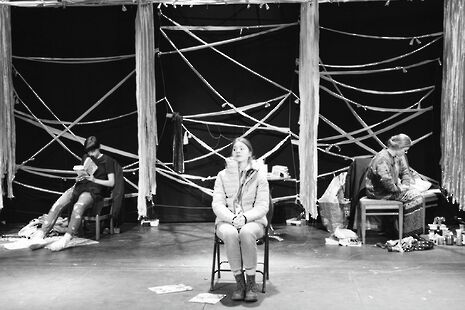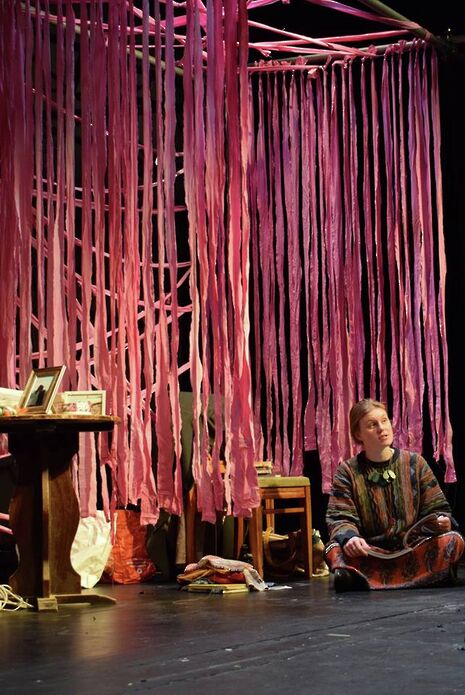Review: Unravelling The Ribbon
Richard Assheton is “astounded by the quality” of this touching play and finds it a fitting homage to Cambridge Pink Week

Frankly, I was astounded by the quality of this production. We are in Tipperary (and Dublin), in the lives of three women touched by the faceless evil of breast cancer. Lyndsey (Emma Corrin) is 11, and pines for a woman’s chest. Her mother Rose (Dolores Carbonari), is at the centre of our story and the centre of cancer’s horror, faced with hospital visits, chemotherapy and hair-loss, all the while responsible for two children and a husband too afraid to understand. Lola (Holly Musgrave) has her cancer, but not its thieving legacy, behind her: breast-less after two mastectomies, husband-less too, she slowly clears her house for sale. Mary Kelly and Maureen White’s 2008 script takes us, mostly through soliloquy, to the heart of our characters’ encounters with this foul illness.
"Attlee’s set conveys the loneliness that serious illness brings"
Set designer Alice Attlee and director Eva O’Flynn skilfully balance the isolation and companionship in the script. In a striking nod to the famous symbol of this disease, Attlee hangs unravelled pink ribbons from the ceiling, framing our three protagonists and their experience. Lyndsey, in her bedroom, flicking through a Harry Potter book and wrapped up in the trials of her school day, Lola, surrounded by her husband’s paintings, encased in a cluttered house and memories she wished she could be rid of, and Rose, in her own bedroom, wrapped up in cancer and then the headscarf that comes with it.
But, just as Attlee’s set conveys the loneliness that serious illness brings, O’Flynn brings our characters out of their frames, with tender mother-daughter moments, a trip to Dublin and a new friendship between two women with shared experiences. Lighting designer, Tom Bevan, separates acts with moments of low and harsh red light, an artful decision which, combined with the dialogue lingering on stage, transports me to the clinical environment of the hospital, the scan and the chemotherapy clinic.

Costume design, the powerful symbol of the headscarf at the centre, produces characters we might know - mothers, daughters and friends we might have had. O’Flynn wisely dismisses sound and music (too many student productions rely on the burst of a punchy track) - the only music here is the astoundingly accurate Irish accents of our actors.
Above all, the outstanding success of Unravelling the Ribbon comes from its student actors. Faced with a script with only three parts, less talented actors may have struggled. They bring to life the rest of our characters, mostly men, in reference and gesture; they are fools of the play, doomed to not understand—Rose tells us that, stunned by clumps of hair left on her pillow, her husband can do nothing more than place an arm around her as she pretends to sleep.
But for Corrin, Musgrave and Carbonari to produce these performances whilst studying for degrees is remarkable. Corrin not only has the energy of an 11-year-old, but the skill to race through her difficult lines without error and to find laugh after laugh and most importantly, the ability to embody the complex emotion of a young girl coming to terms with her mother’s illness.
"Carbonari is a star at the centre, conveying so well a struggling but relied-upon mother. The inflections in her voice give Rose a dark humour and grace"
Equally impressive is Musgrave, who, crossing her arms across her absent breasts, holds our gaze with the confidence of an actor twice her age. Her Lola is a wistful, meadow-voiced woman with a life I never doubted. Carbonari is a star at the centre, conveying so well a struggling but relied-upon mother. The inflections in her voice give Rose a dark humour and grace. Each of them performs with a startling humanity.
The achievements of all involved should be commended. Unravelling the Ribbon is an enthralling play to mark Cambridge Pink Week
 News / Colleges charge different rents for the same Castle Street accommodation2 March 2026
News / Colleges charge different rents for the same Castle Street accommodation2 March 2026 News / King’s hosts open iftar for Ramadan3 March 2026
News / King’s hosts open iftar for Ramadan3 March 2026 Theatre / Lunatics and leisure centres 4 March 2026
Theatre / Lunatics and leisure centres 4 March 2026 News / Angela Merkel among Cambridge honorary degree nominees27 February 2026
News / Angela Merkel among Cambridge honorary degree nominees27 February 2026 News / News in Brief: waterworks, wine woes, and workplace wins 1 March 2026
News / News in Brief: waterworks, wine woes, and workplace wins 1 March 2026







